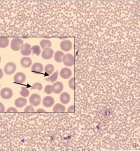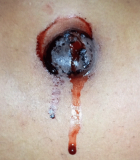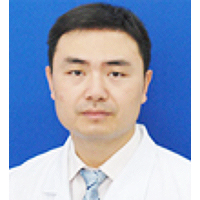Abstract
Research Article
Circulating salusin-beta levels in the patients with age-related macular degeneration
Burak Turgut*, Kadir Mercan, Nesrin Demir, Nevin Ilhan and Onur Çatak
Published: 11 February, 2021 | Volume 5 - Issue 1 | Pages: 001-004
Purpose: To evaluate the levels of salusin-beta (β-SAL) in the serum in patients with age-related macular degeneration (ARMD).
Methods: Our study was designed as a controlled comparative clinical study. The β-SAL levels in serums of age and sex-matched 20 healthy volunteers as controls (Group 1), 20 patients with dry-age related macular degeneration (d-ARMD) (Group 2) and 20 patients with wet-age related macular degeneration (w-ARMD) (Group 3) were measured with the enzyme-linked immunosorbent assay (ELISA) method.
Results: In our study, it was found that age and gender didn’t show a statistically significant difference among the study groups (p > 0. 05). The mean serum β-SAL levels in Group 1, Group 2 and Group 3 were 1372,17 ± 1126.69 pg/mL; 1423,71 ± 1196.84 pg/mL and 940,57 ± 1092.05 pg/mL, respectively. Although the meanβ-SAL levels in w-ARMD seem numerically lower than both the control and d-ARMD groups, this difference among the study groups was not statistically significant (p > 0.05).
Conclusion: Our study suggests that β-SAL levels in the patients with ARMD and healthy controls were not different than each other. Further studies with large numbers may reveal possible relationships between β-SAL and ARMD.
Read Full Article HTML DOI: 10.29328/journal.ijceo.1001034 Cite this Article Read Full Article PDF
Keywords:
Age-related macular degeneration; Dry; Wet; Salusin beta; Serum levels
References
- Ambati J, Ambati BK, Yoo SH, Ianchulev S, Adamis AP. Age-related macular degeneration: etiology, pathogenesis, and therapeutic strategies. Surv Ophthalmol. 2003; 48: 257–293. PubMed: https://pubmed.ncbi.nlm.nih.gov/12745003/
- Ratnapriya R, Chew EY. Age-related macular degeneration-clinical review and genetics update. Clin Genet. 2013; 84: 160-166. PubMed: https://pubmed.ncbi.nlm.nih.gov/23713713/
- Scholl HP, Fleckenstein M, Charbel Issa P, Keilhauer C, Holz FG, et al. An update on the genetics of age-related macular degeneration. Mol Vis. 2007; 13: 196–205. PubMed: https://pubmed.ncbi.nlm.nih.gov/17327825/
- Moschos MM, Nitoda E, Chatziralli IP, Demopoulos CA. Age-Related Macular Degeneration: Pathogenesis, Genetic Background, and the Role of Nutritional Supplements. J Chem. 2014; 2014: Article ID 317536. 9.
- Patel M, Chan CC. Immunopathological aspects of age-related macular degeneration. Semin Immunopathol. 2008; 30: 97–110. PubMed: https://pubmed.ncbi.nlm.nih.gov/18299834/
- Ambati J, Atkinson JP, Gelfand BD. Immunology of age-related macular degeneration. Nat Rev Immunol. 2013; 13: 438-451. PubMed: https://pubmed.ncbi.nlm.nih.gov/23702979/
- Copland DA, Theodoropoulou S, Liu J, Dick AD. A perspective of AMD through the eyes of immunology. Invest Ophthalmol Vis Sci. 2018; 59: AMD83-AMD92. PubMed: https://pubmed.ncbi.nlm.nih.gov/30025105/
- Wu J, Sun X. Complement system and age-related macular degeneration: drugs and challenges. Drug Des Devel Ther. 2019; 13: 2413–2425. PubMed: https://pubmed.ncbi.nlm.nih.gov/31409975/
- Kauppinen A, Paterno JJ, Blasiak J, Salminen A, Kaarniranta K. Inflammation and its role in age-related macular degeneration. Cell Mol Life Sci. 2016; 73: 1765–1786. PubMed: https://pubmed.ncbi.nlm.nih.gov/26852158/
- Knickelbein JE, Chan CC, Sen HN, Ferris FL, Nussenblatt RB. Inflammatory Mechanisms of Age-related Macular Degeneration. Int Ophthalmol Clin. 2015; 55: 63–78. PubMed: https://pubmed.ncbi.nlm.nih.gov/26035762/
- Sato K, Watanabe R, Itoh F, Shichiri M, Watanabe T. Salusins: potential use as a biomarker for atherosclerotic cardiovascular diseases. Int J Hypertens. 2013; 2013: 965140.
- Suzuki-Kemuriyama N, Nakano-Tateno T, Tani Y, Hirata Y, Shichiri M. Salusin-β as a powerful endogenous antidipsogenic neuropeptide. Sci Rep. 2016; 6: 20988.
- Xu T, Zhang Z, Liu T, Zhang W, Liu J, Wang W, Wang J. Salusin-β contributes to vascular inflammation associated with pulmonary arterial hypertension in rats. J Thorac Cardiovasc Surg. 2016; 152: 1177-1187. PubMed: https://pubmed.ncbi.nlm.nih.gov/27353339/
- Zhao MX, Zhou B, Ling L, Xiong XQ, Zhang F, et al. Salusin-β contributes to oxidative stress and inflammation in diabetic cardiomyopathy. Cell Death Dis. 2017; 8: e2690. PubMed: https://pubmed.ncbi.nlm.nih.gov/28333148/
- Cakir M, Duzova H, Taslidere A, Orhan G, Ozyalin F. Protective effects of salusin-α and salusin-β on renal ischemia/reperfusion damage and their levels in ischemic acute renal failure. Biotech Histochem. 2017; 92: 122-133. PubMed: https://pubmed.ncbi.nlm.nih.gov/28296550/
- Koya T, Miyazaki T, Watanabe T, Shichiri M, Atsumi T, et al. Salusin-β accelerates inflammatory responses in vascular endothelial cells via NF-κB signaling in LDL receptor-deficient mice in vivo and HUVECs in vitro. Am J Physiol Heart Circ Physiol. 2012; 303: H96-105. PubMed: https://pubmed.ncbi.nlm.nih.gov/22561298/
- Sun HJ, Zhao MX, Liu TY, Ren XS, Chen Q, et al. Salusin-β induces foam cell formation and monocyte adhesion in human vascular smooth muscle cells via miR155/NOX2/NFκB pathway. Sci Rep. 2016; 6: 23596. PubMed: https://pubmed.ncbi.nlm.nih.gov/27004848/
- Shichiri M, Ishimaru S, Ota T, Nishikawa T, Isogai T, et al. Salusins: newly identified bioactive peptides with hemodynamic and mitogenic activities. Nat Med. 2003; 9: 1166–1172. PubMed: https://pubmed.ncbi.nlm.nih.gov/12910263/
- Liu J, Ren YG, Zhang LH, Tong YW, Kang L. Serum salusin-β levels are associated with the presence and severity of coronary artery disease. J Investig Med. 2015; 63: 632-635. PubMed: https://pubmed.ncbi.nlm.nih.gov/25730454/
- Sun HJ, Liu TY, Zhang F, Xiong XQ, Wang JJ, et al. Salusin-b contributes to vascular remodeling associated with hypertension via promoting vascular smooth muscle cell proliferation and vascular fibrosis. Biochim Biophys Acta. 2015; 1852: 1709–1718. PubMed: https://pubmed.ncbi.nlm.nih.gov/26001930/
- Fujimoto K, Hayashi A, Kamata Y, Ogawa A, Watanabe T, et al. Circulating levels of human salusin-β, a potent hemodynamic and atherogenesis regulator. PLoS One. 2013; 8: e76714. PubMed: https://pubmed.ncbi.nlm.nih.gov/24098553/
- Suzuki N, Shichiri M, Akashi T, Sato K, Sakurada M, et al. Systemic distribution of salusin expression in the rat. Hypertension Res. 2007; 30: 1255–1262. PubMed: https://pubmed.ncbi.nlm.nih.gov/18344632/
- Izumiyama H, Tanaka H, Egi K, Sunamori M, Hirata Y, et al. Synthetic salusins as a cardiac depressors in rat. Hypertension. 2005; 45: 419–425. PubMed: https://pubmed.ncbi.nlm.nih.gov/15699450/
- Chen WW, Sun HJ, Zhang F, Zhou Y, Xiong XQ, et al. Salusin-β in paraventricular nucleus increases blood pressure and sympathetic outflow via vasopressin in hypertensive rats. Cardiovasc Res. 2013; 98: 344-351. PubMed: https://pubmed.ncbi.nlm.nih.gov/23400761/
- Xiao-Hong Y, Li L, Yan-Xia P, Hong L, Wei-Fang R, et al. Salusins protect neonatal rat cardiomyocytes from serum deprivation-induced cell death through upregulation of GRP78. J Cardiovasc Pharmacol. 2006; 48: 41–46. PubMed: https://pubmed.ncbi.nlm.nih.gov/16954820/
- Erden I, Demir B, Uçak H, Cicek D, Dertlioğlu SB, et al. Serum salusin-α and salusin-β levels in patients with Behcet's disease. Eur J Dermatol. 2014; 24: 577-582. PubMed: https://pubmed.ncbi.nlm.nih.gov/25115151/
- Doyle SL, Campbell M, Ozaki E, Salomon RG, Mori A, et al. NLRP3 has a protective role in age-related macular degeneration through the induction of IL-18 by drusen components. Nat Med. 2012; 18: 791–798. PubMed: https://pubmed.ncbi.nlm.nih.gov/22484808/
- Knickelbein JE, Chan CC, Sen HN, Ferris FL, Nussenblatt RB. Inflammatory Mechanisms of Age-related Macular Degeneration. Int Ophthalmol Clin. 2015; 55: 63–78. PubMed: https://pubmed.ncbi.nlm.nih.gov/26035762/
- Whitcup SM, Sodhi A, Atkinson JP, Holers VM, Sinha D, Rohrer B, Dick AD. The role of the immune response in age-related macular degeneration. Int J Inflam. 2013; 2013: 348092. PubMed: https://pubmed.ncbi.nlm.nih.gov/23762772/
- Malesiński R, Mrugacz M, Bakunowicz-Łazarczyk A. [The role of chemokines in ocular diseases. Part II. Participation of chemokines in ocular diseases]. Klin Oczna. 2007; 109: 340-344. PubMed: https://pubmed.ncbi.nlm.nih.gov/18260294/
- Wallace GR, John Curnow S, Wloka K, Salmon M, Murray PI. The role of chemokines and their receptors in ocular disease. Prog Retin Eye Res. 2004; 23: 435-448. PubMed: https://pubmed.ncbi.nlm.nih.gov/15219876/
- Bhattacherjee P. The role of arachidonate metabolites in ocular inflammation. Prog Clin Biol Res. 1989; 312: 211-227. PubMed: https://pubmed.ncbi.nlm.nih.gov/2508125/
- Wakefield D, Lloyd A. The role of cytokines in the pathogenesis of inflammatory eye disease. Cytokine. 1992; 4: 1-5. PubMed: https://pubmed.ncbi.nlm.nih.gov/1617154/
- Cao S, Ko A, Partanen M, Pakzad-Vaezi K, Merkur AB, et al. Relationship between systemic cytokines and complement factor H Y402H polymorphism in patients with dry age-related macular degeneration. Am J Ophthalmol. 2013; 156: 1176–1183. PubMed: https://pubmed.ncbi.nlm.nih.gov/24083687/
- Liu B, Wei L, Meyerle C, Tuo J, Sen HN, et al. Complement component C5a promotes expression of IL-22 and IL-17 from human T cells and its implication in age-related macular degeneration. J Transl Med. 2011; 9: 1–12. PubMed: https://pubmed.ncbi.nlm.nih.gov/21762495/
- Ardeljan D, Wang Y, Park S, Shen D, Chu XK, et al. Interleukin-17 retinotoxicity is prevented by gene transfer of a soluble interleukin-17 receptor acting as a cytokine blocker: implications for age-related macular degeneration. PLoS One. 2014; 9: e95900. PubMed: https://pubmed.ncbi.nlm.nih.gov/24780906/
- Li Z, Liu B, Maminishkis A, Mahesh SP, Yeh S, et al. Gene expression profiling in autoimmune noninfectious uveitis disease. J Immunol. 2008; 181: 5147–5157. PubMed: https://pubmed.ncbi.nlm.nih.gov/18802119/
- Chen Y, Zhong M, Liang L, Gu F, Peng H. Interleukin-17 induces angiogenesis in human choroidal endothelial cells in vitro. Invest Ophthalmol Vis Sci. 2014; 55: 6968-6975.
- Chen Y, Yang P, Li F, Kijlstra A. The effects of Th17 cytokines on the inflammatory mediator production and barrier function of ARPE-19 cells. PLoS One. 2011; 6: e18139. PubMed: https://pubmed.ncbi.nlm.nih.gov/21479174/
- Bora NS, Jha P, Bora PS. The role of complement in ocular pathology. Semin Immunopathol. 2008; 30: 85–95. PubMed: https://pubmed.ncbi.nlm.nih.gov/18299835/
Similar Articles
-
Intravitreal Ranibizumab/ Lucentis (IVTL) injections in Glaucoma patients-Intraocular Pressure (IOP) elevation and the use of Anterior Chamber Paracentesis (ACP)EA Ansari*. Intravitreal Ranibizumab/ Lucentis (IVTL) injections in Glaucoma patients-Intraocular Pressure (IOP) elevation and the use of Anterior Chamber Paracentesis (ACP) . . 2017 doi: 10.29328/journal.hceo.1001005; 1: 033-041
-
The Role of Omega-3 Essential Fatty Acids in Dry Eye DiseaseWilliam J Faulkner*. The Role of Omega-3 Essential Fatty Acids in Dry Eye Disease . . 2017 doi: 10.29328/journal.ijceo.1001008; 1: 055-059
-
Treatment of Retinal Pigment Epithelial DetachmentAyse Gul Kocak Altintas*,Cagri Ilhan. Treatment of Retinal Pigment Epithelial Detachment . . 2018 doi: 10.29328/journal.ijceo.1001013; 2: 008-014
-
Dry eye syndrome: Therapeutic challenges and future trendsIrami Araújo-Neto,Amália Cinhtia Meneses Rêgo, Irami Araújo-Filho*. Dry eye syndrome: Therapeutic challenges and future trends. . 2019 doi: 10.29328/journal.ijceo.1001023; 3: 030-034
-
Circulating salusin-beta levels in the patients with age-related macular degenerationBurak Turgut*, Kadir Mercan, Nesrin Demir,Nevin Ilhan,Onur Çatak. Circulating salusin-beta levels in the patients with age-related macular degeneration. . 2021 doi: 10.29328/journal.ijceo.1001034; 5: 001-004
-
Ocular manifestations in a case of progeroid syndromeGajaraj T Naik*. Ocular manifestations in a case of progeroid syndrome. . 2021 doi: 10.29328/journal.ijceo.1001040; 5: 025-028
-
Pattern of Eye Disease in Nenwe Rural Eye Clinic, Nigeria: A Seven Year ReviewNnenna Maureen Ozioko*, Nkiru Mary Okoloagu, Emmanuel Sunday Onah, Catherine. Pattern of Eye Disease in Nenwe Rural Eye Clinic, Nigeria: A Seven Year Review. . 2024 doi: 10.29328/journal.ijceo.1001056; 8: 004-015
Recently Viewed
-
Zn2+ Ions-Immune Virucidal activities for children and adults with preventions against 2019-nCoV and COVID-19 infectionTsuneo Ishida*. Zn2+ Ions-Immune Virucidal activities for children and adults with preventions against 2019-nCoV and COVID-19 infection. J Child Adult Vaccines Immunol. 2020: doi: 10.29328/journal.jcavi.1001006; 4: 006-014
-
Exophthalmos Revealing a Spheno Temporo Orbital MeningiomaHassina S*, Krichene MA, Hazil Z, Bekkar B, Hasnaoui I, Robbana L, Bardi S, Akkanour Y, Serghini L, Abdallah EL. Exophthalmos Revealing a Spheno Temporo Orbital Meningioma. Int J Clin Exp Ophthalmol. 2024: doi: 10.29328/journal.ijceo.1001055; 8: 001-003
-
Unveiling the Impostor: Pulmonary Embolism Presenting as Pneumonia: A Case Report and Literature ReviewSaahil Kumar,Karuna Sree Alwa*,Mahesh Babu Vemuri,Anumola Gandhi Ganesh Gupta,Nuthan Vallapudasu,Sunitha Geddada. Unveiling the Impostor: Pulmonary Embolism Presenting as Pneumonia: A Case Report and Literature Review. J Pulmonol Respir Res. 2025: doi: 10.29328/journal.jprr.1001065; 9: 001-005
-
The Pores of Kohn, an Overlooked Pulmonary Structure: A ReviewAboubacar Kaka*,Frederick Merchant. The Pores of Kohn, an Overlooked Pulmonary Structure: A Review. J Pulmonol Respir Res. 2024: doi: 10.29328/journal.jprr.1001063; 8: 063-068
-
Precessional Motion Emerging from Relativistic Component of External ForceJanusz Wolny, Radosław Strzałka*, Ireneusz Bugański. Precessional Motion Emerging from Relativistic Component of External Force. Int J Phys Res Appl. 2024: doi: 10.29328/journal.ijpra.1001100; 7: 148-153
Most Viewed
-
Evaluation of Biostimulants Based on Recovered Protein Hydrolysates from Animal By-products as Plant Growth EnhancersH Pérez-Aguilar*, M Lacruz-Asaro, F Arán-Ais. Evaluation of Biostimulants Based on Recovered Protein Hydrolysates from Animal By-products as Plant Growth Enhancers. J Plant Sci Phytopathol. 2023 doi: 10.29328/journal.jpsp.1001104; 7: 042-047
-
Sinonasal Myxoma Extending into the Orbit in a 4-Year Old: A Case PresentationJulian A Purrinos*, Ramzi Younis. Sinonasal Myxoma Extending into the Orbit in a 4-Year Old: A Case Presentation. Arch Case Rep. 2024 doi: 10.29328/journal.acr.1001099; 8: 075-077
-
Feasibility study of magnetic sensing for detecting single-neuron action potentialsDenis Tonini,Kai Wu,Renata Saha,Jian-Ping Wang*. Feasibility study of magnetic sensing for detecting single-neuron action potentials. Ann Biomed Sci Eng. 2022 doi: 10.29328/journal.abse.1001018; 6: 019-029
-
Physical activity can change the physiological and psychological circumstances during COVID-19 pandemic: A narrative reviewKhashayar Maroufi*. Physical activity can change the physiological and psychological circumstances during COVID-19 pandemic: A narrative review. J Sports Med Ther. 2021 doi: 10.29328/journal.jsmt.1001051; 6: 001-007
-
Pediatric Dysgerminoma: Unveiling a Rare Ovarian TumorFaten Limaiem*, Khalil Saffar, Ahmed Halouani. Pediatric Dysgerminoma: Unveiling a Rare Ovarian Tumor. Arch Case Rep. 2024 doi: 10.29328/journal.acr.1001087; 8: 010-013

HSPI: We're glad you're here. Please click "create a new Query" if you are a new visitor to our website and need further information from us.
If you are already a member of our network and need to keep track of any developments regarding a question you have already submitted, click "take me to my Query."

























































































































































